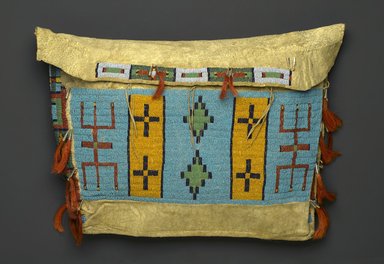
Artist:Sioux
Medium: Hide, beads, tin cones, horse hair
Geograhical Locations:
Dates:ca. 1860–1900
Dimensions: 15 1/2 x 20 1/2 in. (39.4 x 52.1 cm)
Collections:
Exhibitions:
Accession Number: X1111.1
Image: X1111.1_PS1.jpg,
Catalogue Description: Tipi bag or possible bag. The beads are sewn with sinew in a 'lazy stitch'. Kroeber called the design a transverse bar or lengthened checker pattern. Bag is beaded on one side with a decoration of crossed and abstracted forms in red, blue, gold and green. The edges are also beaded with metal jingles and orange dyed horsehair decorations. The two-ended, pitchfork-type design is classic Sioux. It is Central Plains but not Cheyenne or Arapaho. Bead workers would also do this type of beading to show off their expertise so some were also made to be ornamental or given away as gifts.